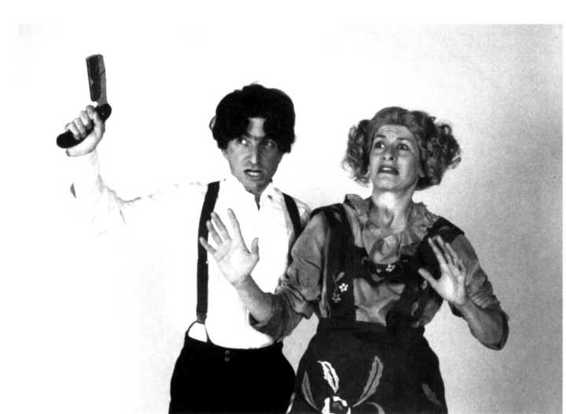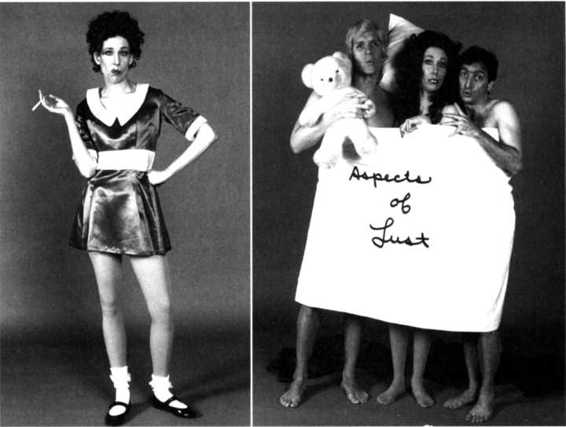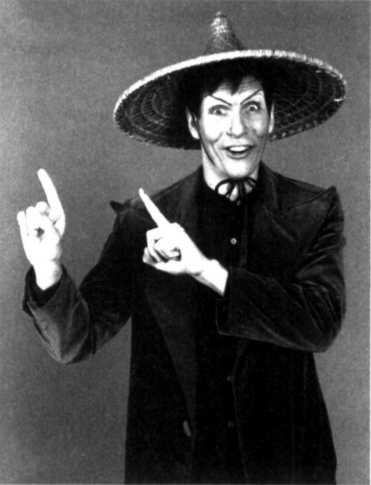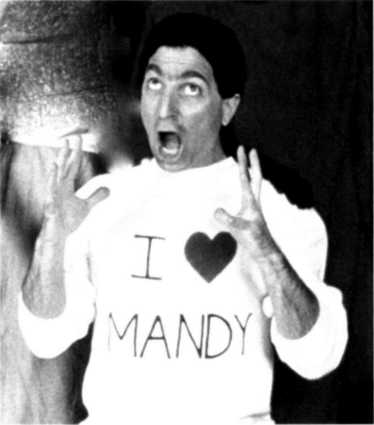Forbidden Broadway: Behind the Mylar Curtain (44 page)
Read Forbidden Broadway: Behind the Mylar Curtain Online
Authors: Gerard Alessandrini,Michael Portantiere

Our audience tolerated my rather lame City of Angels parody, but you could tell
they really wanted to see us attack shows that took themselves too seriously. Sir Andrew Lloyd Webber came to our rescue by delivering Aspects of Love, straight from
London. That show became even more of a target when Sarah Brightman stepped
into it; she was one of our most beloved voodoo dolls at Forbidden Broadway, and we
were always happy to stick a few pins into her shapely bodice and attempt to adjust
her overbite. Our Aspects number was "I Sleep with Everyone," to the tune of "Love
Changes Everything." It was a big hit, partly because who is sleeping with whom in
showbiz is always of great interest to the entire world. (We could do a whole sidebar
on that subject....)
Miss Saigon was a big hit of the early '90s, but it wasn't as spoofable as Les Miz
because the songs weren't as hummable. We did have some fun with all the hoopla about the race-blind casting of Jonathan Pryce as the Engineer in that show. Equity
objected to bringing over a British star for the part, especially because the role was
Eurasian. We spoofed Equity president Colleen Dewhurst objecting to Pryce's castingand what made it really hilarious was that we had Mary Denise Bentley, an AfricanAmerican actress, playing Dewhurst. She appeared onstage and said, "In order to
protest Cameron Mackintosh bringing Jonathan Pryce over from London to play this
role, I have now become black." It was one of the biggest laughs we ever got. Then we
had "Jonathan Pryce" come out and sing "I'm an Asian, Too." That number was Phill
George's idea, and he wrote most of the lyric:

Attend the tale of Teeny Todd! Jeff Lyons and Marilyn Pasekoff.

Left: Susanne Blakeslee as a jaded, chain-smoking Orphan Annie. Right; Herndon Lackey, Susanne Blakeslee,
and Jeff Lyons confess: "I Sleep with Everyone." (On Broadway, who doesn't?)

Herndon lackey as Jonathan Pryce in Miss
Saigon: "I'm an Asian, Too!"
At the time, Phill and I used to work out at the same gym; it was a Bally's on Broadway at 76th Street, located over a D'Agostino's supermarket. We called it "Fags Over
Dag's." I was in aerobics class one day when he came running in, yelling, "Gerard!
Gerard!" The aerobics teacher turned off the music, and Phill shouted, "Colleen Dewhurst just died!" The teacher said, "I'm so sorry, was she a friend of yours?" And I
said, "No, we just lost the biggest laugh in our show!"
"Grim Hotel" was one of my favorite spoofs of that or any year. Grand Hotel
was so easy to make fun of because of all that German Sturm and Drang. A lot
of the music is in minor keys, and there were all those people moving chairs and
shaking milk cartons. We also spoofed the revolving door of the hotel; each actor
would go through the door, change costumes, and come back through the door
as a completely different character. We rehearsed it down to the nanosecond,
and that was when I realized actors could make any costume change in twenty
seconds.
We also got a lot of mileage out of "Teeny Todd," because we realized that this was
the beginning of an era of downsizing on Broadway. I remember thinking that, even in
the case of the Gypsy and Guys and Dolls revivals, the orchestras sounded noticeably
smaller than they should have.
The Will Rogers Follies and Miss Saigon were among the few major hits of the era.
There were some huge flop musicals back then, including Nick and Nora and Anna
Karenina. I wouldn't normally have bothered to spoof a show with a brief run, but I
had few other options. One of our funniest numbers was our take on the expensive
flop production of The Threepenny Opera
that starred Sting. We called it "The 300 Million Penny Opera."

Jeff Lyons, "Somewhat Overindulgent" as
Mandy Patinkin.
This was a transitional period for Broadway-and, of course, for Forbidden Broadway as well. Even though Cats, Les Miz, and
Phantom were British shows, they had given
Broadway a sense of resurgence. But Miss
Saigon was the only British blockbuster of
the early '90s, and my sense was that it didn't
create the same excitement as the others.
Fortunately, this was around the time of
our tenth anniversary, so we assembled a
show of old-favorite numbers performed
by a cast that consisted of three of our most
talented veterans (Patrick Quinn, Michael
McGrath, Leah Hocking) plus one newcomer
(to us anyway), the powerhouse singer-actress Alix Korey. Once, I asked Alix why she
was raising her arm during the final bow as if to indicate that someone was standing
beside her. She said, "That's for the other two actors who should be in this show!" Ever
since then, in every edition, we've had all of the cast members raise their outside arms
in respect of Alix's keen observation. She was absolutely right that we should have six
actors to get through all of the exhausting material in Forbidden Broadway.
Even if there were few new shows for us to target at the time, celebrities were a different matter, and I felt it was a good opportunity to get to work on Mandy Patinkin. He
certainly had been a star on Broadway, but we had never tackled him, so to speak. By
the '90s, he was doing studio recordings and was still quite popular. His performances
were always very intense and passionate, so it was clear what our spoof should be.
Phill George and I listened to his recording of "Somewhere Over the Rainbow" again
and again, and Phill commented, "It's somewhat overindulgent." That was enough. I
picked up a pen, and the rest of the parody lyric wrote itself.